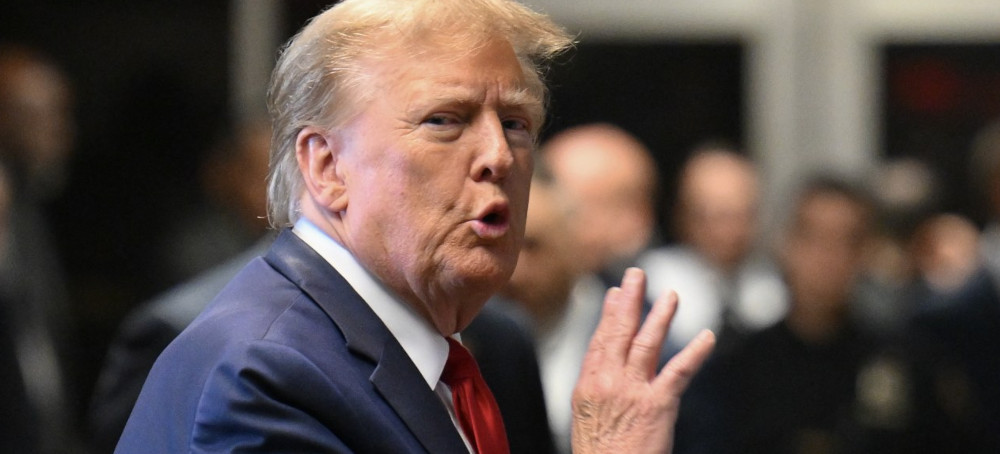Cannon Misfires: Trump Appointee Saves Her Old Boss
David Faris Newsweek Florida Judge Aileen Cannon has come under fire from a number of legal experts after delaying the start of Donald Trump's classified documents trial, with one lawyer labeling her 'intellectually out of league'. (photo: Newsweek)
Florida Judge Aileen Cannon has come under fire from a number of legal experts after delaying the start of Donald Trump's classified documents trial, with one lawyer labeling her 'intellectually out of league'. (photo: Newsweek)
ALSO SEE: Judge Cannon Indefinitely Postpones Donald Trump's Trial for Classified Document Retention
Cannon's decision is part of a months-long standoff with Special Counsel Jack Smith, who has grown increasingly frustrated with Cannon's transparent delay tactics. In April, Cannon requested jury instructions regarding the Presidential Records Act—which isn't the statute under which Trump is being prosecuted. That would be the Espionage Act. Cannon requested jury instructions that reflected "different scenarios," including one with the Trump defense's premise that he was legally entitled to walk out of the White House with basically whatever classified information he wanted. "That legal premise is wrong," Smith wrote last month, "and a jury instruction... that reflects that premise would distort the trial."
A brief recap of the case is probably in order. When Trump left office in a childish huff weeks after trying to overthrow the American system of government in early 2021, he carted reams of classified material with him to his home in Mar-a-Lago, Florida. The prosecution alleges that he was deeply involved in preparing these materials and spiriting them away to Florida. He bragged about it to whoever was listening, basically dared the federal government to come and retrieve its property and then refused to cooperate with government officials who were bending over backward to avoid a scene—or a prosecution of a former president already facing a litany of other potential charges for other crimes committed before, during, and after his presidency. Trump was ultimately charged with 37 counts of violating the Espionage Act, making false statements, obstruction of justice and conspiracy to obstruct justice.
This isn't the first delay in the trial. Cannon took two months to rule on a February 2024 motion to dismiss the case from the defense, based on the idea that he was entitled to take whatever he wanted to Mar-a-Lago under the Presidential Records Act. She had already managed to push the trial back months, by insisting, for example, on a plodding third-party review of the documents. The very real complications of conducting a trial about classified documents (including restrictions on who can see the documents and where they can see them) means that they are going to run headlong into the schedule for Trump's D.C.-based election interference and insurrection trial, which is itself being delayed by the Supreme Court's outrageous decision to consider Trump's total immunity from any crime committed as president.
The endgame here is not subtle. Trump's entire legal strategy for this has been from the very beginning to somehow delay it until after the 2024 election. At that point, Trump hopes to be president-elect, and then to pardon himself, his associates and anyone else involved with his vast criminal enterprise after he is inaugurated. Cannon, cleverly, has never directly endorsed that logic but with every decision big and small, she has sought to indirectly manifest it. That leaves Trump and Cannon with the best of both worlds—the appearance of impartiality but the practical effect of making it impossible to prosecute the case until the 2024 election has been decided.
The fact that Cannon is a Trump appointee—a controversial one at that, given her lack of jury trial experience at the time of her nomination in 2020—is not necessarily the issue. Federal judges are appointed by presidents of both parties and their provenance should not have any bearing on individual cases. A strong argument for recusal could be made here, though, given Trump's role in elevating her to her position in the first place. The truly troubling pattern that has emerged from Cannon's courtroom, however, is a bizarre deference to every half-baked scheme put forward by the Trump legal team and her refusal to move the trial along at even a snail's pace.
Cannon's delay tactics are now merely part of a tapestry of judicial and prosecutorial failure that has left the federal government incapable of prosecuting a man who still makes open threats to the constitutional order. If you can't prosecute a former government official, particularly one who is seeking to once again claim the presidency and the near-total impunity that the Supreme Court apparently thinks comes along with it, in the four long years between presidential elections, the American system of governance is much more vulnerable to authoritarian takeover than was previously understood. It means that virtually any president or White House official can commit crimes with impunity knowing that their team will probably be back in power by the time the wheels of justice start grinding along.
What happens next is anyone's guess. Smith could seek to have Cannon removed from the trial, a richly deserved outcome but perhaps not one that will move things along more swiftly. Ultimately, it looks like it will once again fall to America's voters to hold up the country's once-vaunted democratic guardrails, since no one in the federal government seems interested in or capable of keeping the republic away from this criminal huckster who is openly telegraphing his plans to subvert democracy – again.



